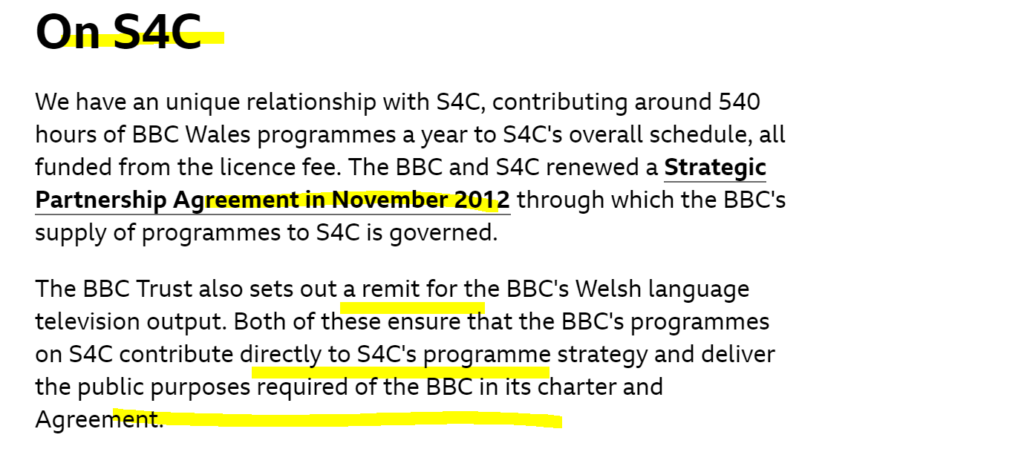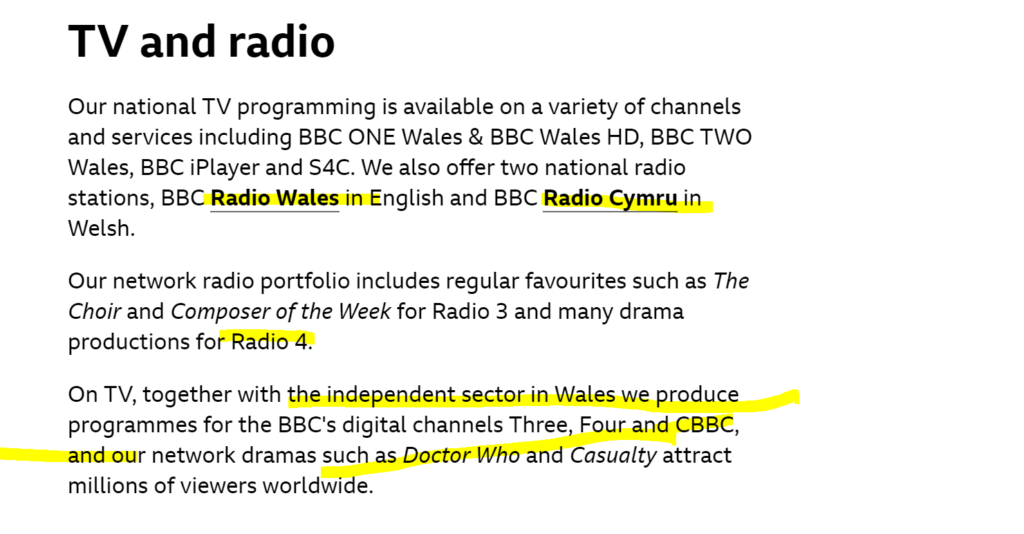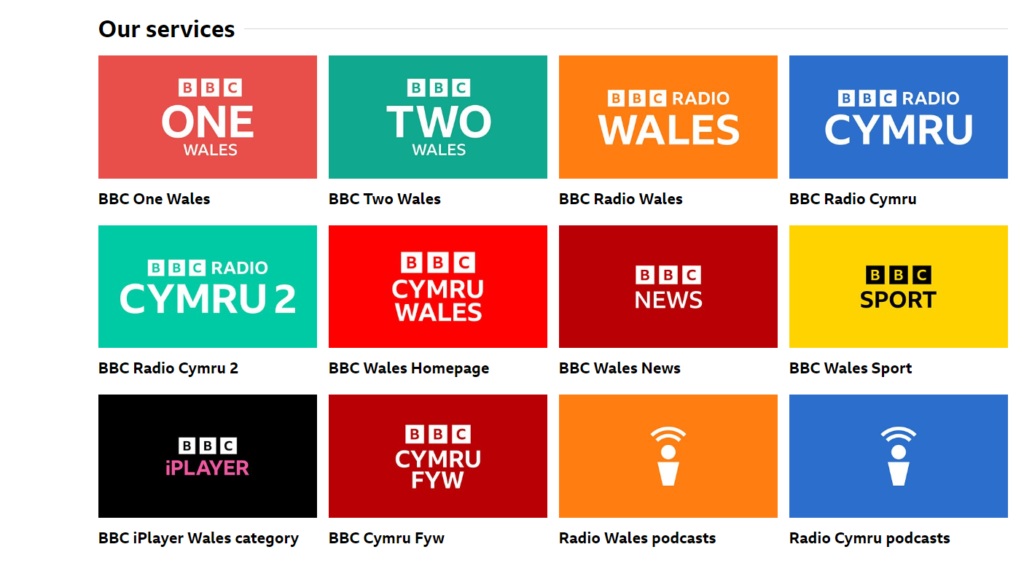British Broadcasting Corporation{BBC} : The BBC, or British Broadcasting Corporation, is a public service broadcaster based in the UK. It’s known for its news coverage, educational programming, and entertainment content. It was founded in 1922 and is one of the oldest and largest broadcasters in the world. Is there something specific you’d like to know about the BBC?
Certainly! The BBC operates under a Royal Charter and is funded primarily through a television license fee paid by households in the UK. This model is intended to ensure its independence and impartiality, as it doesn’t rely on advertising revenue or political influence.
The BBC has a wide range of services, including:
- Television: It runs several TV channels, including BBC One, BBC Two, BBC News, and BBC iPlayer, which provides on-demand streaming of its programming.
- Radio: The BBC operates numerous radio stations, such as BBC Radio 1, Radio 2, Radio 3, and Radio 4, covering a broad spectrum of music, news, and talk shows.
- Online: The BBC’s website and digital platforms offer news, entertainment, and educational content, reaching a global audience. The BBC News website is a major source of international news and analysis.
- Production and Content: Beyond news and entertainment, the BBC is known for its high-quality dramas, documentaries, and nature programs. Series like “Doctor Who,” “Sherlock,” and “Planet Earth” have gained international acclaim.
- Global Presence: The BBC World Service broadcasts internationally in multiple languages, providing global news coverage and in-depth reporting.
The BBC has faced various challenges over the years, including debates about its funding model and its role in the media landscape, but it remains a cornerstone of British media and a significant player on the global stage.
Certainly! The BBC’s influence and operations extend beyond its primary broadcasting activities:
- Cultural Impact: The BBC has played a significant role in British cultural life, producing iconic shows and fostering new talent. Its programming has often set trends and influenced public discourse in the UK and beyond.
- Educational Initiatives: The BBC is involved in educational programming and resources. Its educational content is aimed at various age groups, from school children to adults, and covers a range of subjects including science, history, and literacy.
- Technology and Innovation: The BBC has been at the forefront of technological advancements in broadcasting. It was one of the pioneers of television and radio technology and continues to innovate with new media formats and digital services. The BBC was instrumental in developing and adopting high-definition (HD) and ultra-high-definition (4K) television standards.
- International Collaborations: The BBC collaborates with other international broadcasters and media organizations on joint projects and co-productions. These partnerships enhance its global reach and allow it to offer diverse content.
- Public Service Commitment: As a public service broadcaster, the BBC’s mission is to inform, educate, and entertain. Its charter obligates it to provide impartial and accurate news, support the arts, and contribute to the cultural and social fabric of the nation.
- Challenges and Criticisms: The BBC faces scrutiny and challenges from various fronts. There are ongoing debates about its funding model, particularly the license fee system, and discussions about its editorial impartiality. Additionally, it must navigate the evolving media landscape and competition from digital platforms and global streaming services.
- Future Directions: Looking ahead, the BBC is focusing on adapting to changing media consumption habits, particularly with the rise of digital and streaming platforms. It is investing in new technologies, expanding its digital content, and exploring ways to engage younger audiences while maintaining its core values and public service mission.
The BBC’s impact on media and culture is profound, and its evolution reflects broader changes in the media industry and society as a whole. Its commitment to providing high-quality, unbiased information and diverse programming continues to shape its role in both national and global contexts.
Absolutely, let’s delve deeper into some additional aspects of the BBC’s role and future:
- Diversity and Inclusion: The BBC has been working to improve diversity and inclusion within its workforce and programming. This includes efforts to represent a broader range of voices and perspectives in its content and ensuring that its staff reflects the diversity of the UK population. The BBC has faced both praise and criticism for its progress in this area, with ongoing discussions about how to better represent and engage with various communities.
- Local and Regional Programming: The BBC maintains a commitment to regional and local content across the UK. This includes local news, cultural programming, and community-focused initiatives through its regional services. The aim is to ensure that viewers and listeners across different regions have access to content that reflects their local context and interests.
- Digital Transformation: As media consumption increasingly shifts online, the BBC is investing heavily in digital transformation. This includes enhancing its digital platforms, like the BBC iPlayer, and expanding its online presence through social media and mobile apps. The goal is to remain relevant in a rapidly evolving media landscape and to provide content that meets the needs of digital audiences.
- Sustainability and Environment: The BBC has committed to sustainability and reducing its environmental impact. This includes efforts to make its operations more eco-friendly, such as reducing carbon emissions, managing waste, and promoting environmental awareness through its programming.
- Public Accountability: The BBC is subject to oversight by the BBC Board and various regulatory bodies. This oversight ensures that the BBC adheres to its public service remit and maintains high standards of accuracy, impartiality, and accountability. The BBC’s governance and regulatory framework is designed to balance independence with public accountability.
- Global Influence: The BBC’s global presence through the World Service extends its influence far beyond the UK. It provides a critical source of news and information in regions where press freedom may be restricted. The World Service’s global reach helps shape international perceptions and provide diverse perspectives on global issues.
- Future Challenges: The BBC faces several future challenges, including adapting to the evolving digital media landscape, competition from global streaming giants, and navigating geopolitical tensions that affect its international operations. Balancing innovation with its public service mandate while managing financial pressures and maintaining public trust will be key to its future success.
- Educational Partnerships: The BBC collaborates with educational institutions and organizations to provide valuable learning resources. This includes educational programming, partnerships with schools and universities, and initiatives aimed at supporting lifelong learning.

The BBC’s evolution reflects broader trends in media and technology, and its ability to adapt while staying true to its core values of impartiality, public service, and quality content will
Certainly! Let’s explore a few more aspects and potential future directions for the BBC:British Broadcasting Corporation{BBC}
- Content Innovation: The BBC has been experimenting with new forms of content to engage audiences. This includes virtual reality (VR), augmented reality (AR), and interactive storytelling. These innovations aim to enhance user experience and provide immersive ways to experience news, documentaries, and entertainment.
- International Partnerships: The BBC often partners with international media organizations to co-produce content, share resources, and expand its global reach. These collaborations can enhance the quality and diversity of programming and address global issues from multiple perspectives. British Broadcasting Corporation{BBC}
- Audience Engagement: Understanding and engaging with audiences is increasingly important for the BBC. This involves using data analytics to tailor content to audience preferences, improving user interfaces for digital platforms, and fostering community interaction through social media and interactive features.
- Future of Public Broadcasting: As public broadcasting faces new challenges and opportunities, the BBC is part of broader discussions about the role of public service media in the digital age. British Broadcasting Corporation{BBC} Debates often focus on the relevance of traditional broadcasting models, the impact of digital disruption, and the future funding mechanisms for public broadcasters.
- Global News and Information: The BBC’s commitment to delivering accurate and impartial news remains crucial in a world where misinformation can spread rapidly. The BBC’s rigorous editorial standards and fact-checking processes play a vital role in providing reliable information to its audience.
- Cultural Exchange: Through its diverse programming, the BBC fosters cultural exchange and understanding. Its international content showcases different cultures, promotes dialogue, and contributes to global cultural appreciation.
- Youth Engagement: Engaging younger audiences is a priority for the BBC. British Broadcasting Corporation{BBC} This involves creating content that resonates with younger viewers, leveraging new digital platforms, and addressing issues relevant to younger generations. Initiatives like BBC Three, which focuses on younger demographics, exemplify this approach.
- Funding and Financial Sustainability: Ensuring financial sustainability while adhering to its public service remit is a continuing challenge. Discussions about alternative funding models, such as subscription-based services or government funding, are ongoing. Balancing financial needs with public service commitments remains a key concern.
- Crisis Response: The BBC plays a critical role during times of crisis, such as natural disasters, political upheavals, or health emergencies. Its ability to provide timely and accurate information is essential for public safety and awareness.
- Cultural Heritage and Archives: The BBC’s extensive archives are a valuable cultural resource. British Broadcasting Corporation{BBC} Efforts to digitize and preserve historical content ensure that past programming remains accessible and that the BBC’s historical contributions to media and British Broadcasting Corporation{BBC}culture are preserved for future generations.

The BBC’s continued relevance will depend on its ability to adapt to technological changes, address evolving audience needs, and maintain its commitment to public service values. As the media landscape evolves, the BBC’s role as a trusted provider of news, entertainment, and educational content will remain a cornerstone of its mission.
Certainly! Here are additional aspects of the BBC’s role and future directions:British Broadcasting Corporation{BBC}
- Impact on Journalism Standards: The BBC is often seen as a benchmark for journalism standards due to its commitment to impartiality, accuracy, and comprehensive reporting. It plays a significant role in setting standards for the industry and influencing best practices in journalism both in the UK and internationally.
- Innovation in Storytelling: The BBC is exploring new ways to tell stories, such as through podcasts, web series, and interactive documentaries. These formats offer different ways to engage audiences and present information, catering to diverse preferences and consumption habits. British Broadcasting Corporation{BBC}
- Focus on Mental Health: Recognizing the importance of mental health, the BBC has included mental health topics in its programming and reporting. It aims to raise awareness, provide support, and foster open conversations about mental health issues. British Broadcasting Corporation{BBC}
- Regional Representation: The BBC has made strides in representing regional voices and issues across the UK. Local and regional programming helps ensure that diverse perspectives are included in national conversations, and it supports the representation of issues that may be overlooked by more central media outlets. British Broadcasting Corporation{BBC}
- Technology and Data Privacy: As the BBC expands its digital presence, it is also focusing on technology and data privacy. Ensuring that user data is handled responsibly and transparently is crucial for maintaining trust and complying with regulations.
- Educational Content for Children: The BBC produces a wide range of educational content for children, aimed at making learning engaging and accessible. Programs like “CBeebies” and “CBBC” are designed to support early childhood education and offer age-appropriate content that combines entertainment with learning.
- Global Development Goals: The BBC aligns some of its programming with global development goals, such as sustainability, human rights, and social justice. This includes covering international issues, promoting global awareness, and supporting initiatives that contribute to positive change.
- Audience Feedback and Adaptation: The BBC actively seeks and incorporates audience feedback to improve its content and services. This involves regular surveys, focus groups, and engagement through social media to understand audience needs and preferences.
- Media Literacy Initiatives: In an era of information overload and misinformation, the BBC is involved in promoting media literacy. Educating the public on how to critically evaluate news sources and identify credible information is part of its mission to support an informed society. British Broadcasting Corporation{BBC}
- Support for Independent Producers: The BBC often works with independent producers and creative talent outside of its own organization. This collaboration helps bring fresh ideas and diverse voices to its programming, enriching the content it offers.
- International Reporting and Conflict Zones: The BBC’s international reporting includes coverage from conflict zones and areas affected by crises. Its correspondents and reporters provide in-depth coverage and analysis, often at great personal risk, to deliver essential news from challenging locations.
- Digital Transformation Strategy: The BBC’s strategy for digital transformation includes investing in new technologies and digital platforms to stay competitive. This involves integrating artificial intelligence (AI) and machine learning to enhance content delivery, personalization, and user experience. British Broadcasting Corporation{BBC}
- Cultural Programming and Arts Support: The BBC supports the arts through various programs that highlight and promote cultural events, performances, and artistic achievements. This includes partnerships with cultural institutions and coverage of significant arts events.
- Adapting to Changing Regulations: As media regulations evolve, particularly in the digital space, the BBC must adapt to new legal frameworks and industry standards. This includes compliance with broadcasting regulations, data protection laws, and digital rights management. British Broadcasting Corporation{BBC}
- Building Community Engagement: The BBC aims to strengthen community ties through initiatives that support local communities and engage with the public. This includes outreach programs, local events, and partnerships with community organizations.
The BBC’s ability to navigate these diverse aspects while staying true to its core mission of public service broadcasting will be key to its ongoing success. Its adaptability, innovation, and commitment to quality content ensure that it remains a vital and influential institution in the media landscape.


